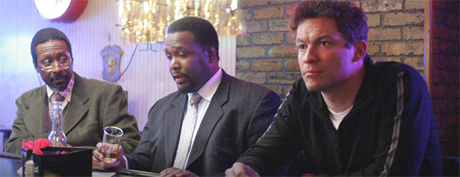
Fare thee well gone away, there’s nothing left to say. Pour a glass of Jamesons and give the devil (way down in the hole) his due: The Wire, a television show with a better claim than most to the title of “Best Ever” (and definitely the best show ever made about American politics), ends this evening. As such, before one last Sunday round with the men and women of Baltimore, some links from the vault:
And you know the only thing better than having enjoyed all 60 hours of the show? Having never seen it at all. If that’s you, pick up Season 1 and start from the beginning — you’re in for a real treat.
Update: “The main theme is that…it’s a newspaper that is so eviscerated, so worn, so devoid of veterans, so consumed by the wrong things, and so denied the ability to replenish itself that it singularly misses every single story in the season.” The final episode has aired, and David Simon has emerged from behind the curtain for a last round of interviews. “By the way, if you want to not focus on what the fuck’s going on, read the newspapers. Suffer the journalism, and don’t worry: the big picture will elude you nicely.“
